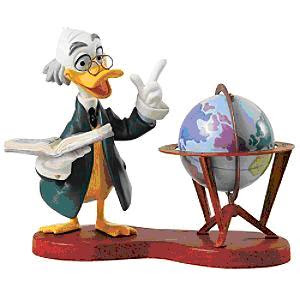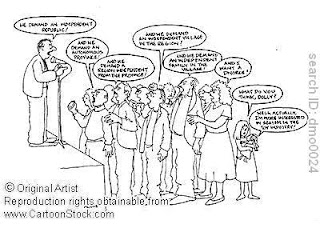dearth
[Middle English derthe, from Old English *d orthu, costliness, from d ore, costly; see dear1.]
–noun
1. an inadequate supply; scarcity; lack: There is a dearth of good engineers.
2. scarcity and dearness of food; famine.

a lack of They suffer from a dearth of resources and of experienced men
कमी, किल्लत, दुर्लभता, अकाल
decorum
[Latin dec rum, from dec rus, becoming, handsome; see decorous.]
1. Appropriateness of behavior or conduct; propriety: "In the Ireland of the 1940's ... the stolidity of a long, empty, grave face was thought to be the height of decorum and profundity" John McGahern.
2. decorums The conventions or requirements of polite behavior: the formalities and decorums of a military funeral.
3. The appropriateness of an element of an artistic or literary work, such as style or tone, to its particular circumstance or to the composition as a whole
demur
[Middle English demuren, to delay, from Anglo-Norman demurer, from Latin d mor r : d -, de- + mor r , to delay (from mora, delay).]
–verb (used without object)
1. to make objection, esp. on the grounds of scruples; take exception; object: They wanted to make him the treasurer, but he demurred.
2. Law. to interpose a demurrer.
3. Archaic. to linger; hesitate.
–noun
4. the act of making objection.
5. an objection raised.
6. hesitation.
7. Law. Obsolete. a demurrer.

[Middle English derthe, from Old English *d orthu, costliness, from d ore, costly; see dear1.]
–noun
1. an inadequate supply; scarcity; lack: There is a dearth of good engineers.
2. scarcity and dearness of food; famine.

a lack of They suffer from a dearth of resources and of experienced men
कमी, किल्लत, दुर्लभता, अकाल
decorum
[Latin dec rum, from dec rus, becoming, handsome; see decorous.]
1. Appropriateness of behavior or conduct; propriety: "In the Ireland of the 1940's ... the stolidity of a long, empty, grave face was thought to be the height of decorum and profundity" John McGahern.
2. decorums The conventions or requirements of polite behavior: the formalities and decorums of a military funeral.
3. The appropriateness of an element of an artistic or literary work, such as style or tone, to its particular circumstance or to the composition as a whole
demur
[Middle English demuren, to delay, from Anglo-Norman demurer, from Latin d mor r : d -, de- + mor r , to delay (from mora, delay).]
–verb (used without object)
1. to make objection, esp. on the grounds of scruples; take exception; object: They wanted to make him the treasurer, but he demurred.
2. Law. to interpose a demurrer.
3. Archaic. to linger; hesitate.
–noun
4. the act of making objection.
5. an objection raised.
6. hesitation.
7. Law. Obsolete. a demurrer.

derision
1350–1400; ME derisioun < href="http://dictionary.reference.com/search?q=deride&db=luna">deride ) + -iōn- -ion
1
a: the use of ridicule or scorn to show contempt
b: a state of being derided
2: an object of ridicule or scorn

Desiccate
Latin desiccatus, past participle of desiccare to dry up, from de- + siccare to dry, from siccus dry
transitive verb
1 : to dry up
2 : to preserve (a food) by drying : dehydrate
3 : to drain of emotional or intellectual vitality
intransitive verb
: to become dried up
1350–1400; ME derisioun < href="http://dictionary.reference.com/search?q=deride&db=luna">deride ) + -iōn- -ion
1
a: the use of ridicule or scorn to show contempt
b: a state of being derided
2: an object of ridicule or scorn

Desiccate
Latin desiccatus, past participle of desiccare to dry up, from de- + siccare to dry, from siccus dry
transitive verb
1 : to dry up
2 : to preserve (a food) by drying : dehydrate
3 : to drain of emotional or intellectual vitality
intransitive verb
: to become dried up
Desication cracks

diatribe
[Latin diatriba, learned discourse, from Greek diatrib , pastime, lecture, from diatr bein, to consume, wear away : dia-, intensive pref.; see dia- + tr bein, to rub; see ter -1 in Indo-European roots.]
–noun
a bitter, sharply abusive denunciation, attack, or criticism: repeated diatribes against the senator.
didactic
[Greek didaktikos, skillful in teaching, from didaktos, taught, from didaskein, didak-, to teach, educate.]
–adjective
1. intended for instruction; instructive: didactic poetry.
2. inclined to teach or lecture others too much: a boring, didactic speaker.
3. teaching or intending to teach a moral lesson.
4. didactics, (used with a singular verb) the art or science of teaching


diatribe
[Latin diatriba, learned discourse, from Greek diatrib , pastime, lecture, from diatr bein, to consume, wear away : dia-, intensive pref.; see dia- + tr bein, to rub; see ter -1 in Indo-European roots.]
–noun
a bitter, sharply abusive denunciation, attack, or criticism: repeated diatribes against the senator.
didactic
[Greek didaktikos, skillful in teaching, from didaktos, taught, from didaskein, didak-, to teach, educate.]
–adjective
1. intended for instruction; instructive: didactic poetry.
2. inclined to teach or lecture others too much: a boring, didactic speaker.
3. teaching or intending to teach a moral lesson.
4. didactics, (used with a singular verb) the art or science of teaching

dilettante
Italian, from present participle of dilettare to delight, from Latin dilectare — more at delight
–noun
1. a person who takes up an art, activity, or subject merely for amusement, esp. in a desultory or superficial way; dabbler.
2. a lover of an art or science, esp. of a fine art.
–adjective 3
. of or pertaining to dilettantes.
disabuse
[French désabuser : dés-, dis- + abuser, to delude (from Old French, to misuse; see abuse).]
To free from a falsehood or misconception: I must disabuse you of your feelings of grandeur.
verb
free somebody (from an erroneous belief)
discordant
–adjective
1. being at variance; disagreeing; incongruous: discordant opinions.
2. disagreeable to the ear; dissonant; harsh.
3. Geology. (of strata) structurally unconformable.

Italian, from present participle of dilettare to delight, from Latin dilectare — more at delight
–noun
1. a person who takes up an art, activity, or subject merely for amusement, esp. in a desultory or superficial way; dabbler.
2. a lover of an art or science, esp. of a fine art.
–adjective 3
. of or pertaining to dilettantes.
disabuse
[French désabuser : dés-, dis- + abuser, to delude (from Old French, to misuse; see abuse).]
To free from a falsehood or misconception: I must disabuse you of your feelings of grandeur.
verb
free somebody (from an erroneous belief)
discordant
–adjective
1. being at variance; disagreeing; incongruous: discordant opinions.
2. disagreeable to the ear; dissonant; harsh.
3. Geology. (of strata) structurally unconformable.

discretion
–noun
1. the power or right to decide or act according to one's own judgment; freedom of judgment or choice: It is entirely within my discretion whether I will go or stay.
2. the quality of being discreet, esp. with reference to one's own actions or speech; prudence or decorum: Throwing all discretion to the winds, he blurted out the truth.
—Idiom3. at discretion, at one's option or pleasure: They were allowed to work overtime at discretion.

disinterested
adjective
1. unbiased by personal interest or advantage; not influenced by selfish motives: a disinterested decision by the referee.
2. not interested; indifferent.
not influenced by private feelings or selfish motives; impartial It would be best if we let a disinterested party decide.
स्वार्थरहित
disparage
[Middle English disparagen, to degrade, from Old French desparager : des-, dis- + parage, high birth (from per, peer; see peer2).]
–verb (used with object), -aged, -ag⋅ing.
1. to speak of or treat slightingly; depreciate; belittle: Do not disparage good manners.
2. to bring reproach or discredit upon; lower the estimation of: Your behavior will disparage the whole family.
disparate
[Latin dispar tus, past participle of dispar re, to separate : dis-, apart; see dis- + par re, to prepare; see per -1 in Indo-European roots.]
–adjective
distinct in kind; essentially different; dissimilar: disparate ideas.
Ex.Disparate HouseWives
dissemble
Middle English dissemblen, from Old French dessembler, to be different : des-, dis- + sembler, to appear, seem; see semblable.]
v.tr.
1. To disguise or conceal behind a false appearance. See Synonyms at disguise.
2. To make a false show of; feign.
v.intr.
To disguise or conceal one's real nature, motives, or feelings behind a false appearance.

make believe with the intent to deceive; "He feigned that he was ill"; "He shammed a headache"
--behave unnaturally or affectedly; "She's just acting"
divulge
[Middle English divulgen, from Old French divulguer, from Latin d vulg re, to publish : d -, dis-, among; see dis- + vulg re, to spread among the multitude (from vulgus, common people).]
–verb (used with object), -vulged, -vulg⋅ing.
to disclose or reveal (something private, secret, or previously unknown).

dogmatic
[Late Latin dogmaticus, from Greek dogmatikos, from dogma, dogmat-, belief; see dogma.]
1. Relating to, characteristic of, or resulting from dogma.
2. Characterized by an authoritative, arrogant assertion of unproved or unprovable principles. See Synonyms at dictatorial.
tending to force one's own opinions on other people He's very dogmatic on this subject. हठी, हठधर्मी
–noun
1. the power or right to decide or act according to one's own judgment; freedom of judgment or choice: It is entirely within my discretion whether I will go or stay.
2. the quality of being discreet, esp. with reference to one's own actions or speech; prudence or decorum: Throwing all discretion to the winds, he blurted out the truth.
—Idiom3. at discretion, at one's option or pleasure: They were allowed to work overtime at discretion.

disinterested
adjective
1. unbiased by personal interest or advantage; not influenced by selfish motives: a disinterested decision by the referee.
2. not interested; indifferent.
not influenced by private feelings or selfish motives; impartial It would be best if we let a disinterested party decide.
स्वार्थरहित
disparage
[Middle English disparagen, to degrade, from Old French desparager : des-, dis- + parage, high birth (from per, peer; see peer2).]
–verb (used with object), -aged, -ag⋅ing.
1. to speak of or treat slightingly; depreciate; belittle: Do not disparage good manners.
2. to bring reproach or discredit upon; lower the estimation of: Your behavior will disparage the whole family.
disparate
[Latin dispar tus, past participle of dispar re, to separate : dis-, apart; see dis- + par re, to prepare; see per -1 in Indo-European roots.]
–adjective
distinct in kind; essentially different; dissimilar: disparate ideas.
Ex.Disparate HouseWives
dissemble
Middle English dissemblen, from Old French dessembler, to be different : des-, dis- + sembler, to appear, seem; see semblable.]
v.tr.
1. To disguise or conceal behind a false appearance. See Synonyms at disguise.
2. To make a false show of; feign.
v.intr.
To disguise or conceal one's real nature, motives, or feelings behind a false appearance.

make believe with the intent to deceive; "He feigned that he was ill"; "He shammed a headache"
--behave unnaturally or affectedly; "She's just acting"
divulge
[Middle English divulgen, from Old French divulguer, from Latin d vulg re, to publish : d -, dis-, among; see dis- + vulg re, to spread among the multitude (from vulgus, common people).]
–verb (used with object), -vulged, -vulg⋅ing.
to disclose or reveal (something private, secret, or previously unknown).

dogmatic
[Late Latin dogmaticus, from Greek dogmatikos, from dogma, dogmat-, belief; see dogma.]
1. Relating to, characteristic of, or resulting from dogma.
2. Characterized by an authoritative, arrogant assertion of unproved or unprovable principles. See Synonyms at dictatorial.

tending to force one's own opinions on other people He's very dogmatic on this subject. हठी, हठधर्मी
No comments:
Post a Comment